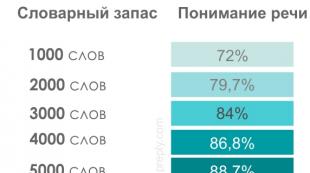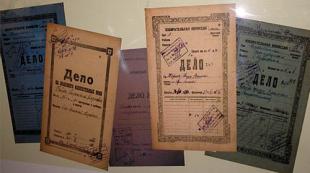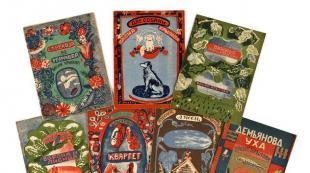Procrustean bed: the meaning of a phraseological unit, its origin. Phraseologism "Procrustean bed" meaning Message Procrustean bed in Russian
And again the phraseological unit that came to us from the myths of ancient Greece .
Procrustean bed - this is probably the most famous, although by no means the most comfortable bed in the world.
Let's look at the meaning, origin and sources of phraseology, as well as examples from the works of writers.
The meaning of phraseology
Procrustean bed- the measure under which they try to fit any thing
Synonyms: limited framework, yardstick, strict requirements
In foreign languages there are direct analogues of the phraseologism "Procrustean bed":
- Procrustean bed (English)
- Prokrustesbett (German)
- lit de Procruste (French)
Procrustean bed: the origin of phraseology
Procrustes was a robber who tricked travelers into his house on the road between Megara and Athens. Then he laid them on his bed and for those for whom it was large, he stretched out his legs, hanging weights on them, and for those who were short, he chopped off the legs along the length of this bed.
But once Procrustes was not lucky to meet young Theseus on the road, who was heading from Troezen to Athens to visit his father King Aegeus. Theseus preferred to lay Procrustes on his bed himself, and since it turned out to be not enough for him, the hero killed the robber in the same way as he himself did with others.
By the way, it was something like Theseus's code of honor: on the way to Athens, he cleared the area from five famous robbers and the Krommion pig, punishing them in the way they dealt with their victims.
Interestingly, Theseus was the brother of Procrustes, their father was the god of the seas Poseidon (and the second, earthly father of Theseus was the king of Athens, Aegeus). But they probably didn't know. In addition, the stormy Poseidon was extremely prolific, the list of his children on Wikipedia has more than 140 characters, including two horses and one ram (Poseidon sometimes appeared to his wives and lovers in unexpected guises, up to a raven). So I wouldn't be surprised if it turned out that along the way, Theseus killed a few more of his brothers in Poseidon, who turned onto a bad path.
Sources
There is evidence that for the first time the story of Procrustes is found in the ancient Greek historian Diodorus Siculus (I century BC) in the "Historical Library":
“After this, Theseus dealt with Procrustes, who lived in Corydallus, located in Attica, and forced travelers passing by to lie down on a certain bed, after which he cut off the protruding parts of those whose bodies turned out to be longer, and stretched those whose bodies turned out to be shorter (προκρούω) legs, which is why he was nicknamed Procrustes (stretcher).
Examples from the works of writers
Such were the robbers of antiquity, all those Diomedes, Corinetes, Sinns, Skirones, Procrustes, and it took the demigods to do over them what is so erroneously called justice. Their descendants, equal to them in courage, will remain masters on the mainland and islands of Greece until Hercules and Theseus reappear on earth. (W. Scott, "Count Robert of Paris")
The count's friends, passing by my couch, liked to make fun of her miserable appearance. They called it the Procrustean bed. (A.I. Kuprin, "Alien Bread")
But no, he wrote and explained, we will never change our title of socialist-revolutionaries, we will never accept principled evolutionism, we will never squeeze ourselves into the Procrustean bed of legalism at all costs, we will never renounce the sacred right of every people to revolution! (A.I. Solzhenitsyn, The Red Wheel)
So, the image of the Procrustean bed is very clear and continues to be popular in the fight against formalism and egalitarianism. However, modern Procrustes, who are inclined to apply a single “Procrustean bed” to a variety of life phenomena for some reason not called robbers. But in vain.
Answer from the working element[guru]
In Greek mythology, there was such a character Procrustes. who measured everyone by his bed, and whoever was longer, cut off his legs.
Answer from 2 answers[guru]
Hello! Here is a selection of topics with answers to your question: how did the phraseological unit Procrustean bed
Answer from Mishka Shengelia[newbie]
PROCRUST'S BED, in Greek mythology, the bed on which the giant robber Procrustes forcibly laid travelers: he chopped off those parts of the body that did not fit in the tall ones, stretched the bodies in the small ones (hence the name Procrustes - "stretching").
Procrustes-Polypemon himself had to lie on this bed: the hero of ancient Greek myths, Theseus, having defeated Procrustes, acted with him in the same way as he did with his captives ...
For the first time, the story of Procrustes is found in the ancient Greek historian Diodorus Siculus (I century BC).
In a figurative sense - an artificial measure that does not correspond to the essence of the phenomenon.
Answer from Anna Sirik[newbie]
This phraseological unit is of ancient Greek origin. There was a robber there, whose name was Procrustes. And he had a bed that you were squeezing, then stretching. The robber was a sadist and I put my aunts on this bed. If the growth of the unfortunate was less than the bed, then he was stretched along the length, while the person was played alive. And if it was hotter then they cut off those parts of the body that stuck out. No one could defeat the Procrustes, only Hercules put him on this bed and cut off his head. Now this phraseological unit is used as an example of what does not fit into a generally pleasant framework. Also Procrustes, the character of the myths of ancient Greece, the robber is also known under the name of home or Polybius, who lay in wait for Travelers on the road between Megara and Athens, he will deceitfully ban his house of travelers, then he put them on his bed and those to whom it was shortly cut off their legs and who were big legs I stretch out longer than this bed
Answer from Ekaterina Vladimirova[newbie]
Crap
Answer from Ludmila Shurchkova[newbie]
In Greek mythology, there was such a character Procrustes. who measured everyone by his bed, and whoever was longer, cut off his legs.
Answer from Yergey Zhilenko[newbie]
Procrustes (dr. - Greek Προκρούστης "stretching") - a character in the myths of Ancient Greece, a robber (also known as Damast or Polypemon), who lay in wait for travelers on the road between Megara and Athens. He tricked travelers into his house. Then he laid them on his bed, and for those for whom it was short, he chopped off the legs, and for those who were large, he extended his legs - along the length of this bed.
Answer from Olga xarhenko[newbie]
I
Answer from Kostya Ostankin[newbie]
Answer from Yuliya Omasheva[newbie]
The expression "Procrustean bed" has become winged and means the desire to fit something under a rigid framework or artificial measure, sometimes sacrificing something significant for this. It is one of the types of logical errors
Procrust (dr. - Greek ??????????? "stretching") - a character in the myths of Ancient Greece, a robber (also known as Damast or Polypemon), who lay in wait for travelers on the road between Megara and Athens. He tricked travelers into his house. Then he laid them on his bed, and for those for whom it was short, he chopped off the legs, and for those who were large, he extended his legs - along the length of this bed.
Answer from Kirill Popov[newbie]
In Greek mythology, there was such a character Procrustes. He measured everyone according to his bed, whoever was larger than that bed he bit off his head and legs, and whoever was less stretched him from which he died.
Answer from Yergey Borisovich[active]
The expression "Procrustean bed" has become winged and means the desire to fit something under a rigid framework or artificial measure, sometimes sacrificing something significant for this. It is one of the types of logical errors
Procrust (dr. - Greek ??????????? "stretching") - a character in the myths of Ancient Greece, a robber (also known as Damast or Polypemon), who lay in wait for travelers on the road between Megara and Athens. He tricked travelers into his house. Then he laid them on his bed, and for those for whom it was short, he chopped off the legs, and for those who were large, he extended his legs - along the length of this bed.
Answer from Proslav Parfilov[newbie]
the man robber Procrustes lured the guests and put them on the bed;
Answer from Guzel Rakhmatullina[newbie]
Procrustean bed is a cruel framework. There used to be such a ruler Procrutus. He lured travelers to his home. There were two beds prepared - one large, the other not very much. Procrustes laid tall people on a small bed, and chopped off the limbs that did not fit. And small people Procrustes laid on a large bed and stretched.
Answer from Oksana teslenko[newbie]
This phraseological unit is of ancient Greek origin. There was a robber there, whose name was Procrustes. And he had a bed that shrunk and stretched. The robber was a sadist and laid his victims on this bed. If the growth of the unfortunate was less than the bed, then he was stretched along the length, while tearing the person alive. And if the victim was larger, then those parts of the body that were sticking out were cut off from her. No one could defeat Procrustes and only Hercules put him on this bed and cut off his head. Now this phraseological unit is used as an example of what does not fit into the generally accepted framework.
Answer from Jovetlana Varawka[newbie]
The Procrustean bed is:
From ancient Greek myths. Procrustes (Greek for "stretching") is the nickname of a robber named Polypemon. He lived by the road and tricked travelers into his house. Then he laid them on his bed, and for those for whom it was short, he chopped off the legs, and for those who were large, he extended his legs - along the length of this bed.
Procrustes-Polypemon himself had to lie down on this bed: the hero of ancient Greek myths, Theseus, having defeated Procrustes, acted with him in the same way as he did with his captives ...
For the first time, the story of Procrustes is found in the ancient Greek historian Diodorus Siculus (I century BC).
Allegorically: an artificial measure, a formal template, under which real life, creativity, ideas, etc. are forcibly adjusted.
Answer from 2 answers[guru]
Hello! Here are other threads with similar questions.
- (from the own name of the mythical robber, who laid his victims on an iron bed and, depending on whether the legs were longer or shorter than it, he cut or stretched them). In figures. meaning: the measure under which they want to fit every business, even if it is ... ... Dictionary of foreign words of the Russian language
From ancient Greek myths. Procrustes (Greek for "stretching") is the nickname of a robber named Polypemon. He lived by the road and tricked travelers into his house. Then he laid them on his bed, and for those for whom it was short, he chopped off the legs, ... ... Dictionary of winged words and expressions
Explanatory Dictionary of Ushakov
PROCRUSTEAN BED. see bed. Explanatory Dictionary of Ushakov. D.N. Ushakov. 1935 1940 ... Explanatory Dictionary of Ushakov
Merka, yardstick Dictionary of Russian synonyms. Procrustean bed n., number of synonyms: 2 limited frames (1) … Synonym dictionary
In Greek mythology, the bed on which the giant robber Procrustes forcibly laid travelers: those who had a short bed, chopped off their legs; those who were long, he pulled out (hence the name Procrustes stretching). In a figurative sense, artificial ... ... Big Encyclopedic Dictionary
The bed on which the giant robber Procrustes forcibly laid travelers: those who had a short bed, chopped off their legs; those who were long, he pulled out (hence the name Procrustes stretching). In a figurative sense, an artificial measure that does not correspond to ... Encyclopedia of mythology
PROCRUST'S BED, in Greek mythology, the bed on which the giant robber Procrustes forcibly laid travelers: he chopped off those parts of the body that did not fit in the tall ones, stretched the bodies of the small ones (hence the name Stretching Procrustes). IN… … Modern Encyclopedia
- "PROCRUST'S BED", Moldova, FLUX FILM STUDIO, 2000, color, 118 min. Costume historical drama. Based on the novel of the same name by the Romanian writer Camille Petrescu. Cast: Petru Vutcarau, Maya Morgenstern, Oleg Yankovsky (see. Oleg YANKOVSKY ... ... Cinema Encyclopedia
The Acts of Theseus, central fragment of the murder of Procrustes, c. 420 410 BC. Procrustes (Procrustes stretching) is a character in the myths of Ancient Greece, a robber (also known by the names of Damast and Polypemon), who lay in wait for travelers on the road ... ... Wikipedia
Books
- Legends about the people of the taiga (set of 3 books), Alexey Cherkasov, Polina Moskvitina. Time and life in this famous trilogy ("Hop", "Red Horse" and "Black Poplar") are subject to special canons. "Tales of the People of the Taiga" open up an amazing world with indefatigable,…
- Procrustean bed, Arthur Strogoff. The center of the novel is the "modern everyday life" of a young talented actress who, with the help of beauty and charisma, managed to win the sympathy of a well-known disgraced politician, imbued with philanthropic ...
PROCRUSTEAN BED
measure, under which they strive to forcibly adjust, adapt what does not fit it. An expression from ancient mythology. Procrustes Polypomenes, the son of Neptune, a robber and torturer, caught passers-by and laid them on his bed. For those whose legs were longer than the bed, he chopped them off, and for those who had them shorter, he pulled them out, hanging weights from their legs.
Handbook of Phraseology. 2012
See also interpretations, synonyms, meanings of the word and what is the PROCRUST BED in Russian in dictionaries, encyclopedias and reference books:
- PROCRUSTEAN BED in the Dictionary-Reference Myths of Ancient Greece:
- the bed on which the giant robber Procrustes forcibly laid travelers: those who had a short bed, chopped off their legs; those who were long, ... - PROCRUSTEAN BED in the Big Encyclopedic Dictionary:
- PROCRUSTEAN BED in the Modern Encyclopedic Dictionary:
- PROCRUSTEAN BED in the Encyclopedic Dictionary:
in Greek mythology, the bed on which the giant robber Procrustes forcibly laid travelers: at the tall ones he chopped off those parts of the body that did not fit, ... - PROCRUSTEAN BED in the Popular Explanatory-Encyclopedic Dictionary of the Russian Language:
only ed. , a stable combination of books. what is the measure, under which smth. is forcibly adjusted. Procrustean bed of fashionable theory. Etymology: Name... - PROCRUSTEAN BED in the New Dictionary of Foreign Words:
1) in ancient Greek mythology - the bed of the robber Procrustes, on which he laid his victims, and to the one who was longer than the bed, ... - PROCRUSTEAN BED in the Dictionary of Foreign Expressions:
1. in ancient Greek mythology - the bed of the robber Procrustes, on which he laid his victims, and to the one who was longer than the bed, ... - PROCRUSTEAN BED in the dictionary of Synonyms of the Russian language.
- PROCRUSTEAN BED
- PROCRUSTEAN BED in the Spelling Dictionary:
procrustian lie, procrustian ... - PROCRUSTEAN BED in the Modern Explanatory Dictionary, TSB:
in Greek mythology, the bed on which the giant robber Procrustes forcibly laid travelers: those who had a short bed, chopped off their legs; those who… - BED in the Dictionary for solving and compiling scanwords.
- BED in the Concise Church Slavonic Dictionary:
- bed... - BED in the Lexicon of Sex:
matrimonial bed; the main attribute and symbol of marital ... - BED
in botany, a plexus of fungal hyphae that forms on the surface (sometimes inside) of a plant (or other substrate) affected by a fungus. The upper part of L. is represented ... - BED in the Encyclopedic Dictionary of Brockhaus and Euphron:
I (Desire-Francois Log? e) - modern. French painter, b. in 1823, was a student of Pico and at first he was engaged in depicting scenes of a village ... - BED in the Encyclopedic Dictionary:
1, -a, cf. 1. A place to sleep, a bed (outdated). Marriage l. 2. Deepening, along which a water stream flows, a glacier passes, ... - PROKRUSTOVO
PROCRUSTE'S BED, in Greek. mythology bed, on which the giant robber Procrustes forcibly laid travelers: those who had a short bed, chopped off their legs; … - BED in the Big Russian Encyclopedic Dictionary:
LODGE OF THE OCEAN, one of Ch. relief elements and geol. structures of the earth. Pl. St. 185 million km 2. Covers deep sea… - BED in the Encyclopedia of Brockhaus and Efron:
(Desire-Francois Log e e) ? contemporary French painter; genus. in 1823, was a student of Pico and at first was engaged in depicting scenes ... - BED in the Full accentuated paradigm according to Zaliznyak:
lo"zhe, lo"zha, lo"zhami, lo"zh, lo"zhu, lo"jam, lo"zhe, lo"zha, lo"zhe, lo"zhami, lo"zhe, ... - BED
Bed in… - BED in the Dictionary for solving and compiling scanwords:
Solemn name... - BED in the Dictionary of synonyms of Abramov:
bed, bed, bed, sofa, bench, bunks, couch. Marriage bed. On deathbed. Cm. … - BED in the dictionary of Synonyms of the Russian language:
abyssal, hammock, wedge, bed, bed, bed, channel, thalassocraton, … - BED in the New explanatory and derivational dictionary of the Russian language Efremova:
1. cf. 1) outdated. A specially arranged place for lying or sleeping; bed. 2) trans. A hole in the ground through which... - BED in the Dictionary of the Russian Language Lopatin:
- BED in the Complete Spelling Dictionary of the Russian Language:
bed, -a (bed; channel; at ... - BED in the Spelling Dictionary:
l`ozhe, -a (bed; channel; at ... - BED in the Dictionary of the Russian Language Ozhegov:
1 Obs sleeping place, bed Marriage l. bed 1 is a depression through which a water stream flows, a glacier passes, and also ... - PROKRUSTOVO
bed. Cm. … - BED in the Explanatory Dictionary of the Russian Language Ushakov:
lodge, cf. 1. Bed (book poets outdated). Marriage bed. And to the joys on the bed of pleasures bashful beauty bowed. Pushkin. 2. … - BED in the Explanatory Dictionary of Efremova:
bed 1. cf. 1) outdated. A specially arranged place for lying or sleeping; bed. 2) trans. An indentation in the soil where... - BED in the New Dictionary of the Russian Language Efremova:
I cf. 1. outdated. A specially arranged place for lying or sleeping; bed. 2. trans. A hole in the ground through which... - BED in the Big Modern Explanatory Dictionary of the Russian Language:
I cf. A specially arranged place for lying or sleeping royal, noble, rich persons; bed for such persons. II cf. Deepening … - DOGMATISM in the Newest Philosophical Dictionary:
(Greek dogma - opinion, doctrine, decision) - a term introduced by the ancient Greek skeptical philosophers Pyrrho and Zeno, who called any philosophy dogmatic in general, ... - DORMITION OF THE HOLY MOTHER OF GOD in the Orthodox Encyclopedia Tree.
- Lion 15 in the Orthodox Encyclopedia Tree:
Open Orthodox Encyclopedia "TREE". Bible. Old Testament. Leviticus. Chapter 15 Chapters: 1 2 3 4 5 6 ... - PROCRUSTES in the Dictionary-Reference Who's Who in the Ancient World:
Legendary Attic Rogue; had a bed in which he laid his victims; if their height was less than the length of the bed, he them ... - YANZHUL IVAN IVANOVICH
Yanzhul (Ivan Ivanovich) is a well-known economist. Born on June 2, 1846 or 1845 in Vasilkovsky district, Kyiv province (father - ... - SOLOVIEV EVGENIY ANDREEVICH in the Brief Biographical Encyclopedia:
Solovyov (Evgeny Andreevich) is a talented writer. Born in 1863; studied at the Faculty of History and Philology of St. Petersburg. university. He was a high school teacher for a short time. … - Mayor in the Literary Encyclopedia:
- the central character of N.V. Gogol's comedy "The Inspector General" (1835, second edition - 1841). In the list of actors: Anton Antonovich Skvoznik-Dmukhanovsky. According to "Remarks... - BOGDANOV in the Literary Encyclopedia:
1. A. is the pseudonym of the politician, philosopher, sociologist, economist and literary critic Alexander Alexandrovich Malinovsky. Since the mid 90s. … - ANDREEVICH in the Literary Encyclopedia:
- pseudonym of Evgeny Andreevich Solovyov - critic and historian of literature (other pseudonyms: Skriba, V. Smirnov, Mirsky). Wrote a number of essays... - ROMANIA in the Great Soviet Encyclopedia, TSB:
(România), Socialist Republic of Romania, SRR (Republica Socialista România). I. General information R. is a socialist state in the southern part of Europe, in ... - PROCRUSTES in the Great Soviet Encyclopedia, TSB:
in ancient Greek mythology, the nickname of a giant robber who forcibly laid travelers on a bed and chopped off the legs of those who were larger than his size, ... - PETRESCU CAMIL in the Great Soviet Encyclopedia, TSB:
(Petrescu) Camil (April 9 or 21, 1894, Bucharest - May 14, 1957, ibid.), Romanian writer, academician of the Academy of the SRR (1948). In the center of dramas ("Fairy Game", ... - INDIAN OCEAN in the Great Soviet Encyclopedia, TSB:
ocean, the third largest ocean on Earth (after the Pacific and Atlantic). It is located mostly in the Southern Hemisphere, between Asia on … - PLANET EARTH) in the Great Soviet Encyclopedia, TSB:
(from the common Slavic earth - floor, bottom), the third planet in the solar system in order from the Sun, the astronomical sign Å or, +. I... - WAGE in the Great Soviet Encyclopedia, TSB:
pay. Under capitalism, wages are a converted form of value, or price, of a specific commodity—labour power. The use value of this…
The hero Theseus is the son of King Aegeus. - Procrustean bed. - Medea wants to poison Theseus. - Thread of Ariadne in the labyrinth of the Minotaur. - Ariadne abandoned by Theseus. - Black sails: the myth of the name of the Aegean Sea. - Amazonomachy. - Theseus and Pirithous in the realm of shadows. - Death of Theseus.
Hero Theseus - the son of King Aegeus
The protagonist of almost all heroic Athenian myths is Theseus. The Athenians wanted to embody in Theseus, just as the Dorians did with Hercules, all the feats and great deeds of the Athenian mythological cycle. But the Athenian hero Theseus never enjoyed such fame among all the Greeks as Hercules, although to give glory and splendor to the name of Theseus, he was credited with feats that are an exact copy of with.
Theseus is the son of the Athenian king Aegeus and Ephra, a descendant. Theseus was born near Troezena, and he was brought up by his grandfather, the wise Pittheus. taught Theseus horse riding, shooting and various gymnastic exercises.
Aegeus, going to Athens, put his sword and sandals under a large and heavy stone and told his wife to send Theseus to him only when he moved this stone and found the sword and sandals.
Sixteen-year-old Theseus picked up a stone, armed himself with a sword, put on sandals and went to Athens to seek his father and glory.
An antique bas-relief, located in the Campanian Museum, depicts the young hero Theseus, surrounded by relatives, raising a stone.
Approaching Athens, Theseus was ridiculed by a crowd of young Athenians for his long clothes, which the ancient Athenians considered a sign of effeminacy. The hero Theseus, who was called the red girl, decided not to show himself to his father Aegeus before he covered his name with glory.
PROCRUSTEAN BED
All the surroundings of Athens in that mythical era were inhabited by robbers who robbed and killed passers-by and terrified the country with their atrocities.
First of all, Theseus went to Epidaurus, where the villain Periphetes raged. Periphetes killed all passers-by with a copper club. The hero Theseus killed Peritheth and took his club for himself.
Then Theseus went to the Isthmus of Corinth and killed another robber there - Sinis. The robber Sinis had the habit of tying all travelers who fell into his hands by the arms and legs to the tops of two trees. Theseus subjected Sinis to the same fate. Several antique vases and bas-reliefs depict this feat of the hero. Theseus also established the Isthmian Games in honor of the god (Neptune). Returning from the Isthmus of Corinth, near Eleusis, Theseus killed the terrible Krommion pig Feya, which devoured people.
the villain Procrustes possessed no less original mania. Procrustes, apparently, wanted all people in the world to be the same height as him. Procrustes had a bed on which he laid his captives. If it turned out that the prisoners of Procrustes did not fit on the Procrustean bed, then he chopped off their heads or legs. On the contrary, if Procrustean bed turned out to be too long, the robber Procrustes pulled the legs of his captives by force until he tore them off.
Having killed Procrustes, Theseus went to fight with Skiron, who threw the travelers he had robbed from the top of the cliff onto the sandy seashore. There the robber Skiron kept turtles, which he fattened with human meat. Theseus in the same way gave Skiron to be eaten by turtles.
Thus, retribution, the primitive expression of justice among the ancient Greeks, plays a prominent role in all the myths about the exploits of Theseus. The hero Theseus is in the myths of ancient Greece, like Hercules, the champion of truth, the guardian of the law, the patron of the oppressed and the formidable opponent of all the enemies of mankind.
Having cleared Attica of the villains, Theseus decided that he could now appear before his father Aegeus, and went to Athens.
Medea wants to poison Theseus
The king of Athens, Aegeus, was then completely dependent on the sorceress Medea, with whom Aegeus entered into marriage.
Medea feared the influence of the hero-son on Aegeus. Seeing that Aegeus did not recognize Theseus, Medea persuaded the king to give the stranger a goblet of poisoned wine during the feast.
Fortunately for Theseus, the hero took out his sword to cut the meat, and father Aegeus, recognizing him by the sword, snatched the goblet from Theseus, which the hero was about to bring to his lips. The cruel Medea was forced to flee from Athens.
Many ancient bas-reliefs depict the scene of this feast. Aegeus snatches the goblet from Theseus, while Medea stands far away, waiting for the effect of the drink she poisoned.
Thread of Ariadne in the Labyrinth of the Minotaur
Theseus helped his father Aegeus get rid of his nephews, who disputed the Athenian throne with him. Then Theseus went to look for a wild marathon bull that was devastating the country. Theseus brought the bull of Marathon alive to Athens and sacrificed it to Apollo. This marathon bull, caught by Theseus, was nothing more than Hercules caught at one time, and then set free by him.
Returning to Athens, Theseus was struck by the sadness that prevailed there. Theseus answered his questions that the time had come to send tribute to the island of Crete to King Minos.
A few years ago, Minos accused Aegeus that Aegeus had killed his son, and begged his father to punish the whole country of Aegeus. The lord of the gods sent a plague on her. The oracle, asked by the Athenians, said that the plague would stop only when they promised to send seven girls and seven boys to the island of Crete every year to be devoured by the monster Minotaur, the son of Pasiphae, the wife of Minos, and a bull. Now the time has come to send this tribute a third time.
Theseus volunteered to go among the youths and kill the monster Minotaur. It was not easy to fulfill this promise, because the Minotaur possessed extraordinary strength. In addition, King Minos, not wanting to flaunt it, kept the Minotaur in a building built by the inventor Daedalus. Which of the mortals fell into the labyrinth of the Minotaur, could no longer get out of it, before all the entrances and exits were tangled there.
Theseus, realizing the danger of the enterprise, went before leaving for advice to the oracle of Apollo, who in turn advised Theseus to resort to the protection of the goddess.
Aphrodite inspired Ariadne, the daughter of Minos, with love for the beautiful hero. Ariadne gave Theseus a ball of thread. End threads of Ariadne remained in her hands so that Theseus could then use this guiding thread to find a way out of the labyrinth. Theseus managed, thanks to his dexterity, to kill the terrible Minotaur and, thanks to the thread of Ariadne, to get out of the labyrinth.
In gratitude for his deliverance, Theseus built a temple to the gods in Troezen.
According to many scientists - researchers of mythology, Theseus' victory over the Minotaur is, as it were, a symbol of the fact that the ancient Greek religion, becoming softer and more humane, began to strive to destroy human victims.
Ancient art quite often depicted the victory of Theseus over the Minotaur. Of the latest artists, Antonio Canova sculpted two sculptural groups on this mythological theme, which are in a museum in Vienna.
Ariadne abandoned by Theseus
When Theseus left the island of Crete, he was followed by Ariadne, the daughter of Minos. But Theseus, probably not wanting to incur the discontent of the Athenians by marrying a foreigner, left Ariadne on the island of Naxos, where the god Dionysus saw.
Such perfidy of the hero of the myths of ancient Greece in relation to the girl who saved his life is a very obscure and inexplicable act in mythology.
Some myths say that Theseus did this in obedience to orders, while others say that Dionysus himself asked Theseus not to take Ariadne far away, whom he chose as his wife.
The myth of Ariadne, abandoned by Theseus, served as a theme for many works of ancient art. In Herculaneum they found on the wall a picturesque image representing Ariadne on the shore; In the distance, the ship of Theseus is removed, and the god Eros, standing near Ariadne, sheds tears with her.
When, at the beginning of the 18th century, the fashion spread to paint portraits of modern faces, giving them the attributes and poses of heroes of ancient mythology and surrounding them with the appropriate setting, the French artist Larguiliere depicted the modern actress Duclos in the image of Ariadne, but in a dress with figs and with a huge plume of feathers on her head. .
Black sails: the myth of the name of the Aegean Sea
The distraction of Theseus was the cause of the death of Aegeus: the son promised his father, if he defeated the Minotaur, to replace the black sails of the ship with white ones, but he forgot to do this. King Aegeus, seeing the returning ship of Theseus with black sails and believing that his son was dead, threw himself from a high tower into the sea, which has since become known as the Aegean.
Amazonomachy
Theseus, having ascended the throne of his father, at first took up the organization of his state, and then went with Hercules on a campaign against.
Theseus married the Amazon queen Antiope, with whom he had a son, Hippolytus. But, returning to his homeland, Theseus left the Amazon Antiope to marry Phaedra, the sister of Ariadne.
The angry Amazons decided to avenge the insult inflicted by Theseus on their queen, and raided Attica, but were defeated and destroyed. This war with the Amazons (Amazonomachy), which the Athenians considered one of the most important facts in their heroic history, is reproduced in countless monuments of ancient art.
Close ties of friendship connected Theseus with the king of the Lapiths, Pirithous, who invited him, along with other noble Athenians, to his wedding with Hippodamia. During the wedding feast, the famous took place, from which Theseus emerged victorious.
Pirithous helped Theseus kidnap Helen, but her brothers took her sister away from Theseus and gave her to the Spartan king Menelaus as a wife.
Pirithous, in turn, asked Theseus to go with him to Pluto's dwelling and help him kidnap the goddess Persephone, for whom Pirithous had a strong love. It was not easy to fulfill such a request, but friendship imposes certain duties. Theseus, willy-nilly, had to agree and go to Hades with Pirithous.
This attempt, however, ended for friends not only sadly, but also shamefully, because the gods, enraged by such audacity, punished Theseus and Pirithous in the following way. Arriving in Hades, both friends sat down to rest on the stones; when Theseus and Pirithous wanted to get up, despite all their efforts, they could not do it. Friends Theseus and Pirifoy, by the will of the gods, stuck to the stones on which they sat in.
And only Hercules, when he came to Hades to get Kerberos (), begged the god Pluto to allow him to release Theseus.
As for the king of the Lapiths, Pirithous, Hercules did not even think about how to get him out of such a difficult and awkward situation.
Death of Theseus
Theseus ended his earthly career very sadly: he went to Skyros to visit King Lycomedes, who, envious of the strength and courage of Theseus, decided to destroy him. The king of Skyros Lykomeds pushed Theseus off the cliff, and the glorious hero died.
There were two famous paintings depicting Theseus in Athens. One of them was written by Parrhasius, and the other by Euphranor. The artist Euphranor said that Theseus Parrhasia ate roses, while his Theseus ate meat.
This apt remark, says the Roman writer Pliny the Elder, very characteristically and correctly determined the direction of the two rival artistic schools of ancient Greece.
A beautiful antique statue of Theseus has survived to this day.

ZAUMNIK.RU, Egor A. Polikarpov - scientific editing, scientific proofreading, design, selection of illustrations, additions, explanations, translations from ancient Greek and Latin; all rights reserved.









